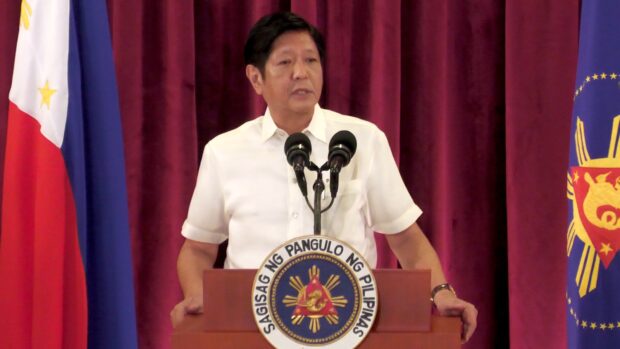Marcos unsure when displaced Saudi OFWs will be paid

President Ferdinand Marcos Jr. delivers a speech at the Villamor Airbase in Pasay City before flying to Saudi Arabia on Thursday, Oct. 19, 2023, to attend the Association of Southeast Asian Nations-Gulf Cooperation Council Summit. (Photo by RYAN LEAGOGO / INQUIRER.net)
RIYADH — The estimated 10,000 overseas Filipino workers (OFWs) displaced during the COVID-19 pandemic would have to wait even longer, but President Ferdinand Marcos Jr. gave assurance that they would receive their back wages from shuttered Saudi companies.
Speaking to journalists before departing for Manila on Friday evening (Saturday dawn in Manila), Marcos stood firm that the OFWs would be paid.
“I cannot say [when] because it also depends on the internal processes in Saudi Arabia but, again, I know for a fact that they will be paid,” he said.
“It’s just a question of when,” the president added.
Marcos gave the assurance just as he wrapped up his two-day visit to this oil-rich kingdom to attend Friday’s maiden meeting of the Association of Southeast Asian Nations-Gulf Cooperation Council. According to the president, the Saudi government has completed the process of “cleaning up” its list of qualified recipients.
Article continues after this advertisement“We are already coming to the point of discussing the details … to be worked out [with] the Saudi side,” he said.
Article continues after this advertisementHe reiterated the Philippine government’s earlier assurances that the displaced OFWs would be paid, even as no categorical pronouncement was given by Saudi officials during his visit.
“In concept, in principle, [the Saudi government] will really push through with the payment of insurance for those who lost their jobs because of COVID. So, that will continue to go,” he said.
“We can eventually resolve that matter.”
The news on the uncertainty of payment did not sit well with some OFWs here, many of whom have been waiting since last year for their back wages while taking on part-time and lower-paying jobs just to make ends meet.
“Having that money will allow me to find better-paying jobs. Or if not, I can just use it to go back home to the Philippines,” said Davao City native Arnold Sumampong.
Other displaced OFWs were also unaware of the anticipated payment after they had moved out to take other jobs, according to Sumampong.